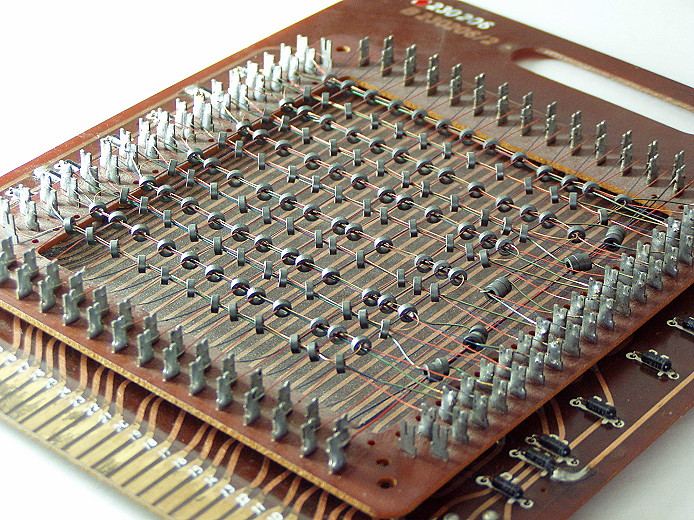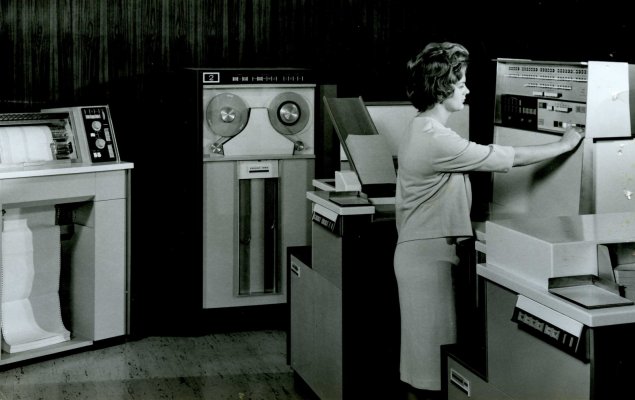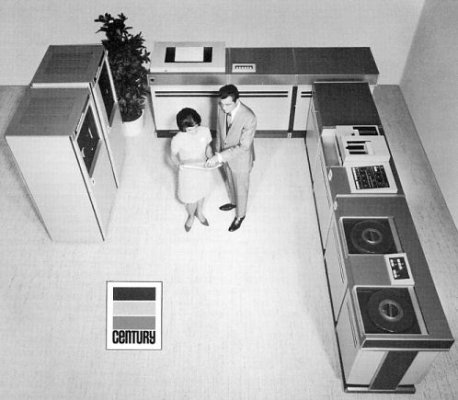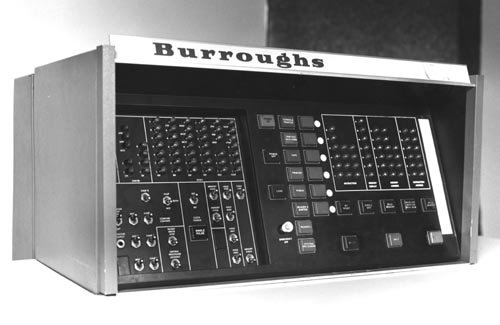Your personal memories and use of computers?
Let me start:
First introduction was in the late 1960's when I started with Montgomery Ward... one of the early retail users of computers in the form of an IBM 605 (I think) punchcard system and a large "white room" with huge tape reels and literally millions of punch cards, with a staff of 8 keypunch operators (Albany NY Catalog House). Screams of distress when someone dropped a large tray of cards after six or seven sorts. Until 1986, 2000+ retail units used keypunch to process orders.
When I moved in as a manager in 1972, the first transition from manual comptometers was taking place in accounting. For the first year, there was only person who had one, a Commodore "nixie tube" monster, (about $1500 then). You had to be directly in front of the deep screen to read the numbers.
One of my jobs was to build budgets for 250 stores... manually with a mechanical calculator... a two month project twice a year.
http://www.hpmuseum.org/monroeia.jpg
The boss broke down and bought me a handheld Sharp ELSI 8
http://www.vintagecalculators.com/assets/images/SharpEL8_6.JPG which cut down the time to three weeks. That one cost $500 at discount prices. Equivalent of today's $1 calculator.
The next actual computer was an ADAM... that Wards sold at Christmas in 1973, when the most common home computer was Pong... by Atari. I bought the ADAM for the family, which gave my young sons a head start on what was then a fast growing technology.
I still have this computer (used a TV screen as monitor).
Next was the TRS80 by Radio Shack in the late 70's, and then
the Sinclair TS1000... around 1983...
In 1986 when I opened my own business, bought an Apple IIE... and a Gerber IV. a precursor of todays' 3D technology, and at the time, the cutting edge of signmaking.
Since then, probably 20 different computers... most salvaged or given to me by neighbors when they upgrade.
Fun to look back ... from the early days, when you had to learn "Basic" to do anything at all. The first 300 Baud modem... the first time on a bulletin board, and the beginning of AOL, when my Username was Bob5...to the first high speed connection to the server @Home in 1996... Wow!... Cable!
@Home Network - Wikipedia, the free encyclopedia
Not much different since then.
So, How far back do you go? Abacus?
Let me start:
First introduction was in the late 1960's when I started with Montgomery Ward... one of the early retail users of computers in the form of an IBM 605 (I think) punchcard system and a large "white room" with huge tape reels and literally millions of punch cards, with a staff of 8 keypunch operators (Albany NY Catalog House). Screams of distress when someone dropped a large tray of cards after six or seven sorts. Until 1986, 2000+ retail units used keypunch to process orders.
When I moved in as a manager in 1972, the first transition from manual comptometers was taking place in accounting. For the first year, there was only person who had one, a Commodore "nixie tube" monster, (about $1500 then). You had to be directly in front of the deep screen to read the numbers.
One of my jobs was to build budgets for 250 stores... manually with a mechanical calculator... a two month project twice a year.
http://www.hpmuseum.org/monroeia.jpg
The boss broke down and bought me a handheld Sharp ELSI 8
http://www.vintagecalculators.com/assets/images/SharpEL8_6.JPG which cut down the time to three weeks. That one cost $500 at discount prices. Equivalent of today's $1 calculator.
The next actual computer was an ADAM... that Wards sold at Christmas in 1973, when the most common home computer was Pong... by Atari. I bought the ADAM for the family, which gave my young sons a head start on what was then a fast growing technology.
I still have this computer (used a TV screen as monitor).
Next was the TRS80 by Radio Shack in the late 70's, and then
the Sinclair TS1000... around 1983...
In 1986 when I opened my own business, bought an Apple IIE... and a Gerber IV. a precursor of todays' 3D technology, and at the time, the cutting edge of signmaking.
Since then, probably 20 different computers... most salvaged or given to me by neighbors when they upgrade.
Fun to look back ... from the early days, when you had to learn "Basic" to do anything at all. The first 300 Baud modem... the first time on a bulletin board, and the beginning of AOL, when my Username was Bob5...to the first high speed connection to the server @Home in 1996... Wow!... Cable!
@Home Network - Wikipedia, the free encyclopedia
Not much different since then.
So, How far back do you go? Abacus?
Last edited:







